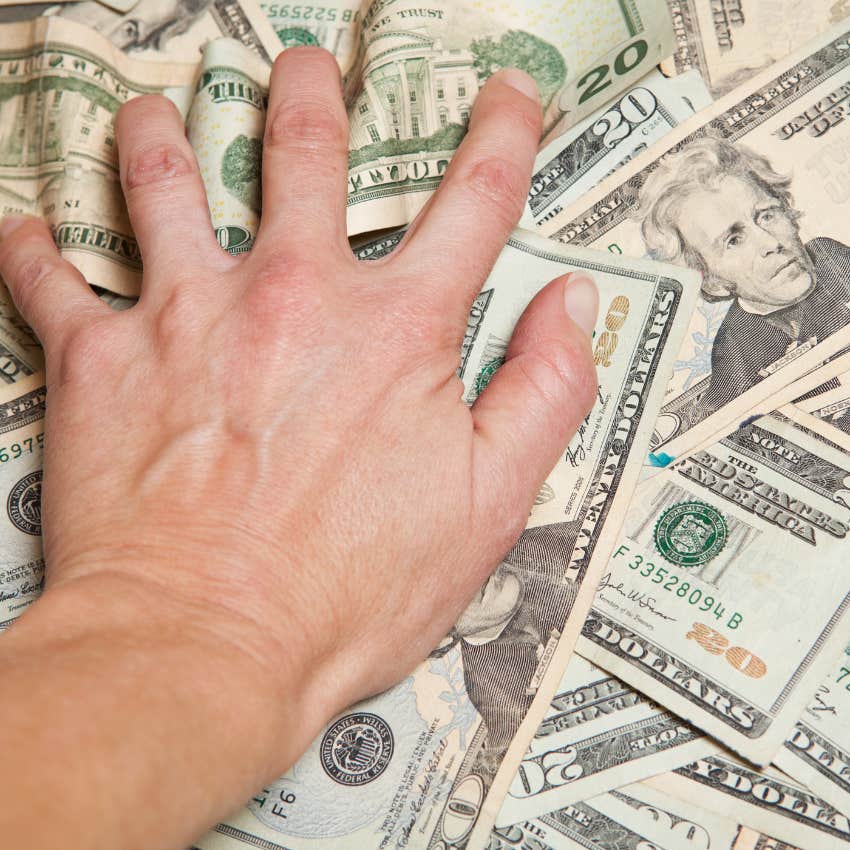11 Behaviors That Make People Look Cheap No Matter How Much Money They Have
You can have more money than anyone you know, but if you behave this way, you still look cheap.
 Nicoleta Ionescu / Shutterstock
Nicoleta Ionescu / Shutterstock Money can’t buy love or make people happy, but it does give us access to the finer things in life, like luxury cars, first-class flights, and an overall sense of financial security. It’s easy to confuse wealth with elegance, but don’t be fooled.
Being rich doesn’t make people high-class, especially when they display behaviors that make them look cheap, no matter how much money they have.
1. Talking on speaker phone in public
No matter how much money people have, using speaker phone in public makes them look cheap. Being wealthy isn’t a free pass for poor etiquette, even though certain rich people think otherwise. It’s one thing to use speaker phone from the comfort of their own homes, but it’s another thing altogether to blast a detailed account of their root canal into a crowd of people who really don’t want that information.
Owning the newest iPhone isn’t an excuse to loud-talk about sensitive subjects in public places. Aside from being noisy and invasive, using speaker phone in public is totally tactless behavior. It’s a great way for people to appear entitled, unaware, and cheap.
2. Being rude to service workers
Treating service workers like they don’t matter makes people look cheap, no matter how much money they have. Just because someone can afford the tasting menu at a five-star restaurant, that doesn’t mean they’ll be polite to the people serving it.
According to organizational psychology professor Dr. Michael Leiter, rude behavior “comes from cluelessness, being inconsiderate, not thinking it through, or simply not imagining that somebody could be offended by something.”
Our society equates wealth with power, which often means that people with lots of money think they’re superior to everyone else. They don’t account for other people’s feelings or experiences. They move through the world like it belongs only to them, which is a cheap and thoughtless way to act.
3. Not tipping
 JackF from Getty Images via Canva
JackF from Getty Images via Canva
As the Great American Tipping Debate rages on, most people have an opinion about who deserves tips and how much they should get. Even people who complain about how out of control tip culture is can’t ignore how low service industry wages are.
Even though there’s an argument to be made against tipping at a self-service lunch spot where you bus your own table, people who have a habit of not tipping look cheap, no matter how much money they have. Like it or not, tips keep people stay afloat in a world that’s only getting more expensive.
4. Excessive couponing
Cutting coupons is a frugal activity that can save a significant amount of money, but there’s a thin line between scoring a deal and being obsessive. According to SimplyCodes’ 2024 Coupon Codes Sentiment Study, 60% of Americans hunt for discount codes when they shop online. Yet the survey found that rich people collect coupons way more than people who make less money.
People with household incomes over $175,000 shop with coupons at a much higher rate than those who make between $10,000 and $24,999 a year. It’s satisfying to shave a few cents off groceries, yet using an excessive amount of coupons makes people look cheap, no matter how much money they have.
5. Bragging
 Konstantin Postumitenko via Canva
Konstantin Postumitenko via Canva
People who flaunt their wealth usually make more enemies than friends. No matter how much money someone has, bragging about their bank account makes people look cheap. Bragging is a behavior that’s rooted in insecurity. It might seem like people who brag have big egos, but really, most of them have a serious inferiority complex.
According to licensed mental health counselor Dr. Vanessa Milagros, people brag for two reasons: to make others jealous or angry and to “elicit a status or hierarchy of, ‘I am better than you because of the things that I possess, or I want you to know that I'm better than you.’”
She explained the difference between bragging and sharing, saying, “If you're happy about something that you got and you want to share it with someone, it’s not to boast, it’s so that they can be happy with you.”
6. Cutting in line
Sometimes, privileged people think that rules don’t apply to them, as though being rich means they get to do whatever they want. Even though the Golden Rule is the first thing kids learn in kindergarten, there’s no guarantee that people remember that essential lesson once they’re grown-up and flush with cash.
No matter how much money people have, cutting in line makes them look cheap. It’s a blatantly rude behavior that sends the message that their time is more valuable than everyone else’s.
7. Chronic lateness
 TommL from Getty Image Signature via Canva
TommL from Getty Image Signature via Canva
If time is money, being late is a behavior that makes people look cheap, no matter how much money they have. Consistency is a key part of every successful relationship, and showing up on time is a way to let other people know that they matter.
According to psychologist Dr. Linda Sapadin, chronic lateness can have negative social consequences. “You're creating a reputation for yourself, and it's not the best reputation to be establishing,” she explained. ”People feel they can't trust you or rely on you, so it impacts relationships. It also impacts self-esteem.”
It’s never easy to break patterns and build new habits, but letting go of lateness is worth the effort. Being considerate of people’s schedules is a sign of good manners and absolute abundance.
8. Low emotional intelligence
People who don’t extend empathy to others look cheap, no matter how much money they have in the bank. According to a study on social psychology, lower-income people are better at noticing emotions than wealthier people, an indication of empathic accuracy.
Michael Kraus, the co-author of the study, defined empathic accuracy as “a person’s ability to accurately read emotions that other people are feeling.”
“A lot of what we see is a baseline orientation for the lower class to be more empathetic and the upper class to be less [so],” he said. “Coming from an environment where you’re more vulnerable, you solve problems by turning to others.”
Empathy asks people to stay curious and step outside their individual bubbles so they can see the world from a different perspective. Caring about others is vulnerable, but it’s also incredibly powerful. Emotional intelligence is more than just a soft skill. It’s a sign of how rich someone truly is.
9. Acting greedy
 sdominick from Getty Images Signature via Canva
sdominick from Getty Images Signature via Canva
Saving money is a crucial part of building up wealth, but people who hold their assets in a vice-grip aren’t being frugal, they’re being greedy. There’s a big difference between making cautious financial decisions and being cheap.
People who earn less money give more of their annual income to charity than rich people do. The study revealed that lower-class people were more generous and more willing to extend help to someone in distress. Putting yourself first isn’t always a bad thing, but extending compassion to those in need is the real way to find wealth.
10. Sacrificing self-care
Self-care is about more than spending money on manicures and moisturizer. True self-care is based on balance. It’s about listening to your body and giving yourself love, because you know you’re worthy.
“Severe underspenders neglect basic self care,” financial psychologist Brad Klontz explained, “They don't go to the dentist or doctor because [they] don’t want to spend the money.”
Financial anxiety is valid, but when people’s fears overshadow their ability to tend to their needs, it becomes a more serious issue. No matter how much money people have, they look cheap if they don’t practice self-care in a consistent way.
11. A lack of gratitude
Acting ungrateful makes people look cheap, no matter how much money they have. Making money is a tricky thing. The richer people are, the less they appreciate what they have. They’re so focused on maintaining, they forget to feel joyful for the lives they’re already living.
Inga Nielsen, an Intuitive Healer, pointed out that gratitude is “the most life-changing practice… to bring in abundance, joy and the sense of being in the now.”
“It helps to name the things you are grateful for, and also practice this throughout the day,” she shared. “It is very difficult to get to a better place, even to a different place, without cultivating gratitude.”
The best part of any gratitude practice is that it costs nothing at all, yet the return on investments are sky-high.
Alexandra Blogier, MFA, is a staff writer who covers psychology, social issues, relationships, self-help topics, and human interest stories.

